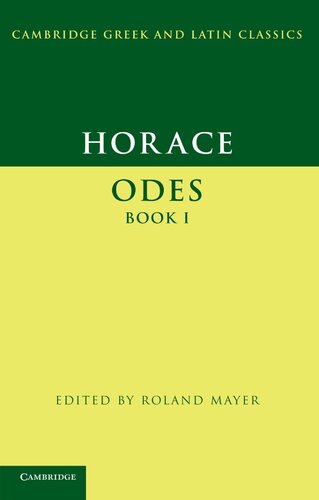
Horace: Odes Book I PDF
Preview Horace: Odes Book I
HORACE O D E S BOOK I edited by ROLAND MAYER ProfessorofClassics,King’sCollegeLondon Cambridge University Press 978-0-521-85473-3 - Horace: Odes: Book I Edited by Roland Mayer Frontmatter More information University Printing House, CambridgeiCB2i8BS,iUnited Kingdom Cambridge University Press is part of the University of Cambridge. It furthers the University’s mission by disseminating knowledge in the pursuit of education, learning and research at the highest international levels of excellence. www.cambridge.org Informationonthistitle:www.cambridge.org/9780521671019 (cid:2)c RolandMayer2012 Thispublicationisincopyright.Subjecttostatutoryexception andtotheprovisionsofrelevantcollectivelicensingagreements, noreproductionofanypartmaytakeplacewithoutthewritten permissionofCambridgeUniversityPress. Firstpublished2012 4th printing 2014 Printedin the United Kingdom by Clays, St Ives plc. AcataloguerecordforthispublicationisavailablefromtheBritishLibrary LibraryofCongressCataloguinginPublicationdata Horace. [Carmina.Liber1.English] Odes,bookI/Horace;editedbyRolandMayer. p. cm.–(CambridgeGreekandLatinclassics) Includesbibliographicalreferencesandindexes. isbn978-0-521-85473-3(hardback) 1.Horace–TranslationsintoEnglish. 2.Odes,Latin–TranslationsintoEnglish. 3.Rome–Poetry. I.Mayer,Roland,1947– II.Title. pa6395.m39 2012 874(cid:3).01–dc23 2012002646 isbn978-0-521-85473-3Hardback isbn978-0-521-67101-9Paperback CambridgeUniversityPresshasnoresponsibilityforthepersistenceor accuracyofURLsforexternalorthird-partyinternetwebsitesreferredto inthispublication,anddoesnotguaranteethatanycontentonsuch websitesis,orwillremain,accurateorappropriate. © in this web service Cambridge University Press www.cambridge.org Cambridge University Press 978-0-521-85473-3 - Horace: Odes: Book I Edited by Roland Mayer Frontmatter More information CONTENTS Preface pagevii Listofabbreviations viii 1 Introduction 1 Lyricimpulseandlyricchallenge 1 2 Technicalchallengesoflyric 5 5 A. Metre 9 B. Linguisticregisterandstyle 10 C. Wordorderandplacement 3 ThearchitectureoftheOde 12 13 A. Linearprogression 13 B. Situationandresponse 15 C. ThepartsoftheOde 4 Thearrangementofthebook 17 5 Datesofcompositionandpublication 19 6 Transmissionofthetextandthetraditionofcomment 19 7 Interpretation:anote 20 21 Q.HORATIFLACCICARMINVMLIBERPRIMVS 51 Commentary 228 Bibliography 240 Indexes v © in this web service Cambridge University Press www.cambridge.org Cambridge University Press 978-0-521-85473-3 - Horace: Odes: Book I Edited by Roland Mayer Frontmatter More information © in this web service Cambridge University Press www.cambridge.org Cambridge University Press 978-0-521-85473-3 - Horace: Odes: Book I Edited by Roland Mayer Frontmatter More information PREFACE The date of the informal commissioning of this commentary is easy for me to recover,since6July2004waswhentheHoratianSocietyhelditsannualdinnerin theOldHallofLincoln’sInn,London.Italsohappenedthattheeditorialboard ofthisserieshadmetearlierthatafternoon,anddecidedthatonetitletheseries neededwasHorace’sfirstbookofodes.OurSociety’sthenPresident,TedKenney, showed some art in snaring his commentator. Pre-dinner drinks on a summer eveningundertheshadeofplanetrees,viewsoverperfectlawnstoflowerborders andfinebrickbuildingsnaturallylowerone’sresistance,especiallywhenagood dinnerwithgoodfriendsisinprospect.Itwasatsomepointduringtheseconvivial proceedingsthatTedproposedthatIshouldundertakethepresentwork.Oiledas Iwas,andabletodenyhimnothinganyway,Inaturallyassented.Onlythenext daydidtheenormityofthatassentbecomeevident,butasReasonbegantototter backtoherthrone,theenormitywasreducedtoamoremanageablescale.As anundergraduateIhadreadNisbetandHubbard’sindispensablecommentary shortly after its appearance, but in later years, using it as a university teacher, IoftenwonderedwhatIcanhavemadeofit,sinceitwasclearlynotdesigned with me in mind. The basic aim of the present commentary is to provide the studentreaderwiththesortofinformationthatwillfacilitatetheconstrueofthe text.Beyondthat,guidanceisprovidedforanappreciationofHorace’scraft,his useoflanguage,metre,andhisconstructionofhispoems.Interpretationofeach poemposedarathermoredifficultissue,aboutwhichsomethinghasbeensaid attheendoftheIntroduction. Overtheyearsassistancewithqueriesonmanymattershasbeencheerfully andauthoritativelyprovidedbyfriendsandcolleagues.Myespecialthanksare owed to E. L. Bowie, G. D’Alessio, A. Dyck, N. Holzberg (especially for his bibliographicalinformation),J.North,D.W.Rathbone,M.L.West,W.Wootton, and two MA groups who vetted portions of the commentary at various draft stages.MrN.BryantKirklanddrewmyattentiontoHeaney’spoembasedon Carm.24. April2011 R.G.M. vii © in this web service Cambridge University Press www.cambridge.org Cambridge University Press 978-0-521-85473-3 - Horace: Odes: Book I Edited by Roland Mayer Frontmatter More information ABBREVIATIONS BoIndex Bo,D.,Q.HoratiFlacciOpera,vol.iiiDeHoratipoeticoeloquio (Turin,1960) BoLexicon Bo,D.,LexiconHoratianum,2vols.(Hildesheim1965–6) CAH Bowman,A.K.,E.Champlin,andA.Lintott,eds.,The Cambridgeancienthistory,2ndedn.VolumexTheAugustanempire, 43BC–AD69(Cambridge1995) CIL CorpusinscriptionumLatinarum(Berlin1863–) CLE Buecheler,F.andE.Lommatzsch,eds.,CarminaLatina epigraphica(Leipzig1895–1926) D–S Daremberg,C.,andE.Saglio,eds.,Dictionnairedesantiquit´es grecquesetromainesd’apr`eslestextesetlesmonuments(Paris1877–1919) E–J Ehrenberg,V.,andA.H.M.Jones,Documentsillustratingthereigns ofAugustusandTiberius,2ndedn(Oxford1976) EO Mariotti,S.,ed.,Orazio:Enciclopediaoraziana(Rome1996–8) FLP Courtney,E.,ThefragmentaryLatinpoets,2ndedn(Oxford2003) G–L Gildersleeve,B.L.,andG.Lodge,Gildersleeve’sLatingrammar, 3rdedn(London1895) GEP Gerber,D.E.,ed.,trans.,Greekelegiacpoetry(Loebclassical library258)(Cambridge,Mass.,andLondon1999) GIP Gerber,D.E.,ed.,trans.,Greekiambicpoetry(Loebclassical library259)(Cambridge,Mass.,andLondon1999) GL Campbell,D.A.,ed.,trans.,Greeklyric(Loebclassicallibrary 142,143,461,476,144;5vols.)(Cambridge,Mass.,andLondon 1982–93) GLK Keil,H.,ed.,GrammaticiLatini(Leipzig1857–80) GP Gow,A.S.F.,andD.L.Page,eds.,TheGreekAnthologyii:The GarlandofPhilip(Cambridge1968) HE Gow,A.S.F.,andD.L.Page,eds.,TheGreekAnthologyi: Hellenisticepigrams(Cambridge1968) H–S Hofmann,J.B.,andA.Szantyr,LateinischeSyntaxundStilistik (Munich1965) K–H Kießling,A.andR.Heinze,Q.HoratiusFlaccusOdenundEpoden, 10thedn(Berlin1960) K–S Ku¨hner,R.,andC.Stegmann,Ausfu¨hrlicheGrammatikder lateinischenSprache,iiSatzlehre.2vols.5thednrev.byA. Thierfelder(Hanover1976) LIMC Lexiconiconographicummythologiaeclassicae(Zurich1981–97) LTUR Steinby,E.M.,ed.,LexicontopographicumurbisRomae(Rome 1993–2000) viii © in this web service Cambridge University Press www.cambridge.org Cambridge University Press 978-0-521-85473-3 - Horace: Odes: Book I Edited by Roland Mayer Frontmatter More information LIST OF ABBREVIATIONS ix N–H Nisbet,R.G.M.andM.Hubbard,AcommentaryonHorace:Odes Booki(Oxford1970) N–H Nisbet,R.G.M.andM.Hubbard,AcommentaryonHorace:Odes Bookii(Oxford1978) NLS Woodcock,E.C.,AnewLatinsyntax(London1959,repr.1985) NP Cancik,H.andH.Schneider,eds.,DerneuePauly:Enzyklopa¨die derAntike(Stuttgart,1996–2003)(theEnglishedn,Brill’sNew Pauly,maybeconsulted,butthetranslationssometimesdistort theoriginal) N–R Nisbet,R.G.M.andN.Rudd,AcommentaryonHorace:Odes Bookiii(Oxford2004) N–W Neue,F.,andC.Wagener,FormenlehrederlateinischenSprache, 3rdedn(Berlin1892–1905) OCD Hornblower,S.,andA.Spawforth,eds.,TheOxfordclassical dictionary,3rdednrev.(Oxford2003) OLD Glare,P.etal.,eds.,OxfordLatindictionary(Oxford1968–82) RE Pauly,A.,G.Wissowa,andW.Kroll,eds.,Real-Encyclopa¨dieder classischenAltertumswissenschaft(Stuttgart1893–1980) Roby Roby,H.J.,AgrammaroftheLatinlanguage,2vols.(London 1871–4) Roscher Roscher,W.H.,ed.,Ausfu¨hrlichesLexicondergriechischenund ro¨mischenMythologie(Leipzig1884–1937) TLL ThesauruslinguaeLatinae(Stuttgart,Munich,andLeipzig1900–) © in this web service Cambridge University Press www.cambridge.org INTRODUCTION . LYRIC IMPULSE AND LYRIC CHALLENGE medoctarumhederaepraemiafrontium dismiscentsuperis,megelidumnemus NympharumqueleuescumSatyrischori secernuntpopulo,sinequetibias EuterpecohibetnecPolyhymnia Lesboumrefugittenderebarbiton. These lines of Horace’s first and programmatic ode suggest to us at least one reason why he tackled the challenge of composing lyric poems in Latin. His earliestsuccesshadbeeninthenativeRomangenreofsatire.Thesubjectmatter of satire was everyday life, and its characteristic tone was critical. The writer of satire – he might not even regard himself as a poet (cf. S. ..–) – had thereforetokeephisfeetontheground.Thelyricpoetontheotherhandescaped theworldofeveryday(secernuntpopulo),heremovedhimselftoacoolgrove,far awayfromtheheatofthetown,wherehejoinedthedancewithnimbleNymphs andSatyrs.NymphsandSatyrsofcourseonlyexistinanimaginationnurtured onliterarytradition(doctus),notinthesatirist’srealworld.Theimaginationof the lyric poet, who now dons the persona of the uates (cf. .), is inspired by Muses(EuterpeandPolyhymnia);thesatiristneedednosuchassistance,norwas hedoctus,inthewaythatalyricpoetwas.Lyricisthuspresentedintheselinesas somethingbothliberatinganddemanding. The liberating power of lyric was generated above all by its diversity as a genre. To a Roman reader and poet the Greek tradition of lyric song was presentedasa‘canon’ofninepoets,whoserangeofthemesandtonesanswered humanexperiencefarmorefullythantherestrictedscopeofRomansatire.On transforminghimselfintoalyricuates,Horacecoulddealwithmorevariedissues andsituations,whichallhaddifferentandappropriatetonesofvoiceforhimto develop. This variety was part and parcel of the tradition of lyric composition whichheappropriatedfromGreece.Greeklyricwaspolymorphous,thanksto theserviceofsonginoccasionspublic(praise,lament,prayer)andprivate(love andfriendship,thesymposium).ThelyrictraditionthuskeptHoracelinkedto a realistic world in which men and women fall in love, enjoy a drink together Here and in the commentary poems within the first book are referred to by their number,andwhereneededlinenumber. Fortheso-calledcanonoflyricpoetsseePfeiffer:–.Forahandyoverview ofHorace’sexploitationofthecanonicalsingersseeG.Burzacchini,art.‘melica’inEO –. 1 2 INTRODUCTION (Carm.),needconsolingforthelossoflovedones(Carm.),praytothegods (Carm. , , and ), or are moved either to celebrate congenial divinities in hymns(Carm.,)ortosecurethefavourofapotentiallydangerousone(Carm. ).Suchsituationsarecommon,butlyrictreatmentinvitedgreaterrefinement thanthesatires;inthesatires,forinstance,menhavedinnertogether,inthelyrics theymeetforsymposia(Carm.and). Fantasytooisliberatedandrefined by the lyric: in the fourth ode, Horace envisages a springtime in which Venus dances beneath the moon with her retinue of Nymphs and Graces, engaging figureswhohadnotappearedinLatinpoetrybeforeHorace.Satirecouldnot riseaboveafartingPriapus(S...–). Evenwheresatiresharedthemeswithlyric,suchasthecharmsofthecountry- sideorsex,thelyrictreatmentwillappealmoretotheimaginationorfancy.This is achieved for instance by the introduction of the religious or divine element, which was excluded from the realistic genres of satire or invective. In Carm. Horacedoesnothesitatetoclaimthathiscountryestateisunderthedirect protection of Faunus, a figure who would have no place in an account of the farminthesatires.Moreover,thegirlhewelcomesintothisprotectedlandscape, Tyndaris,isamusician,whereasinsatireHorace’sgirlfriendsofchoicearehardly socongenialandattractive(cf.S...–and.–).Lovecouldbeexplored inlyricmoresympatheticallyandmorevariously(albeitidiosyncratically). But the appropriation of lyric, if it was to prove relevant, presented the poetwithparticularchallenges:HoracehadtoremodeltheAlcaeantraditionfor Romanconditions.Theseconditionswerefundamentallydifferentfromthoseof thesmaller,simpler,andpoorerworldoftheGreek.Horace’sworldwasaltogether grander. His readers were masters of a vast territorial empire, and one of his addressees,Iccius,isofftoconquerArabia(poem).TheRomans’privatelife wasaltogethermoreluxurious,andsoitisimpossibletoimagineAlcaeuslisting anythingcomparabletothegrandscruswhichwefindinpoem.Contemporary politicalconditionsatRomewerefarmoremomentousthananythingAlcaeus hadbeeninvolvedin.Grantedhehadbeenactiveinthepoliticallifeofhisown community(cf.Lesbiociui.),hishistoricalactivitylookslikelittlemorethan turf-warswhencomparedtotherecentcivilconflictsoftheRomans.ThusHorace MurrayisfundamentalonHorace’sadroitadaptationofsymposiasticsongto Romansocialpractices. N–H : observe with reference to the extravagance of the second ode that Horace‘allowshimselfalicenceinanodethatwouldhavebeenimpossibleinaprosaic epistle’. SeeKrasser:. Theoldbattleoverthe‘Pyrrha’odehighlightsHorace’sbewildering‘take’onerotics: seeQuinn=Rudd:–andWest:–. ThisissueisdiscussedinmoredetailbyN–H:xii:‘thedifferencesbetweenthe twopoetsareinfactmoreilluminatingthantheresemblances’andHubbard:–; similarly,Wilkinson:speaksofthe‘smallamountofspirit’Horacederivedfromhis models.
